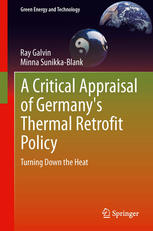

Most ebook files are in PDF format, so you can easily read them using various software such as Foxit Reader or directly on the Google Chrome browser.
Some ebook files are released by publishers in other formats such as .awz, .mobi, .epub, .fb2, etc. You may need to install specific software to read these formats on mobile/PC, such as Calibre.
Please read the tutorial at this link: https://ebookbell.com/faq
We offer FREE conversion to the popular formats you request; however, this may take some time. Therefore, right after payment, please email us, and we will try to provide the service as quickly as possible.
For some exceptional file formats or broken links (if any), please refrain from opening any disputes. Instead, email us first, and we will try to assist within a maximum of 6 hours.
EbookBell Team

0.0
0 reviewsGermany is seen as a leader in thermal retrofit policy and practice, but how effective is its approach? A Critical Appraisal of Germany's Thermal Retrofit Policy examines this policy in context and assesses its effectiveness. It finds that technical constraints and the costs of retrofitting reduce the rate of progress, while planning underestimates the influence of user behavior in the form of rebound and prebound effects. A key finding is that savings can be maximized within a policy that understands the actual behavior and motivation of households, the area where most energy savings are already taking place.
The book suggests a new policy paradigm that would encourage a better balance of partial and comprehensive retrofits, utilizing household behavior changes based on a better understanding of fuel saving motivation and fuel price elasticity. In this approach, the thermal building regulations would be made more flexible so that policymakers would:
- Promote partial, transitional and cost-optimal retrofits, which are more certain to pay back through fuel savings if they are appropriate to building typology and homeowner budgets.
- Promote comprehensive retrofits for reasons other than economic gain, focusing instead on the comfort and environmental benefits of energy-efficient homes.
- Invest more heavily in educating households to heat economically, learning from the prebound effect so as to maximize the utility of the homes they currently occupy, and base payback time calculations on actual consumption.
The results and findings of this book would be of interest to policymakers, researchers and graduate students alike.